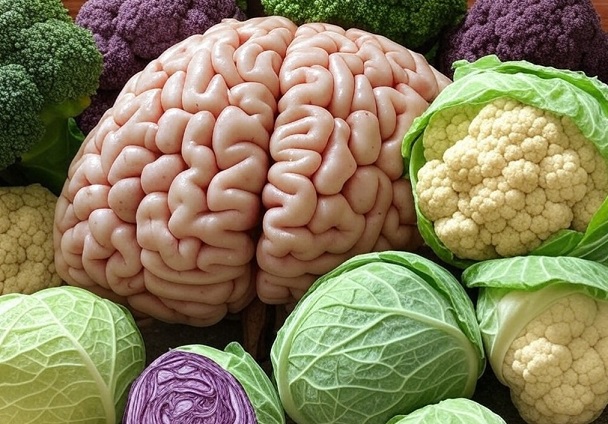The Benefits of Cruciferous Vegetables and Moringa for Neuropsychiatric Disorders
Nikhil Prasad Fact checked by:Thailand Medical News Team Jan 14, 2025 1 year, 1 month, 2 weeks, 5 days, 13 hours, 39 minutes ago
Medical News: A recent comprehensive review highlights the potential role of isothiocyanate-rich plants, such as broccoli and moringa, in managing various neuropsychiatric conditions. Researchers from institutions including Purdue University, Johns Hopkins School of Medicine, UMass Chan Medical School, and the University of Maine in USA have consolidated findings from over 80 preclinical and clinical studies to underline the therapeutic promise of these plant compounds. This
Medical News report delves into their findings and implications for health.
 The Benefits of Cruciferous Vegetables and Moringa for Neuropsychiatric Disorders
The Benefits of Cruciferous Vegetables and Moringa for Neuropsychiatric Disorders
Isothiocyanates (ITCs), found in cruciferous vegetables, possess properties that combat inflammation, oxidative stress, and other harmful processes within the body. Among these, sulforaphane, a compound derived from broccoli, has garnered attention for its ability to cross the blood-brain barrier and exert protective effects on the nervous system. The study also explored other plants like moringa, which is rich in the ITC moringin, known for its nutrient-dense profile and potential health benefits.
Understanding the Mechanisms of Action
ITCs are produced when glucosinolates, their precursors in plants, interact with enzymes during chewing or preparation. The process relies on myrosinase, an enzyme that activates the compounds. However, factors such as gut microbiota, individual genetic variability, and the way the plants are processed can influence the effectiveness of these compounds. For example, sulforaphane is activated in the body through a cascade of chemical reactions that engage the Nrf2 pathway, a crucial mechanism for cellular defense.
Clinical Evidence in Autism Spectrum Disorder
The review noted significant progress in understanding how sulforaphane could improve core symptoms of autism spectrum disorder (ASD). Several randomized controlled trials (RCTs) revealed improved social interaction and reduced repetitive behaviors in participants treated with sulforaphane supplements. In some cases, the benefits were sustained for years when dietary sources of glucoraphanin, sulforaphane's precursor, were maintained. However, the results varied based on the method of preparation and delivery.
Promising Results in Schizophrenia
Schizophrenia, a complex neurodevelopmental condition, was another focus of the review. Clinical studies found that sulforaphane supplementation enhanced cognitive functions and reduced symptoms associated with oxidative stress and inflammation. Though the outcomes were not universally significant, the researchers highlighted the need for more robust trials to establish definitive conclusions.
Potential in Neurodegenerative Diseases
Conditions such as Alzheimer’s and Parkinson’s diseases have also been studied concerning ITC treatments. Preclinical models showed that sulforaphane could prevent the accumulation of harmful proteins like beta-amyloid in Alzheimer’s and protect dopamine
rgic neurons in Parkinson’s. The antioxidant and anti-inflammatory properties of these compounds play a pivotal role in reducing disease progression and improving quality of life.
Expanding the Scope to Other Disorders
Apart from autism and schizophrenia, the review touched on cerebral palsy, fetal alcohol syndrome disorders, and traumatic brain injuries. The common thread across these conditions was the ability of ITCs to activate pathways that protect neurons and reduce inflammation. For instance, studies on rodent models demonstrated reduced cognitive deficits and enhanced cellular protection when treated with sulforaphane or moringin.
A Call for Future Research
While the findings are promising, the authors emphasized the need for more well-designed clinical trials to translate these discoveries into therapeutic practices. Variability in results due to differences in study protocols, dosages, and individual responses highlights the complexity of this field.
Conclusion
The potential of isothiocyanates in managing neuropsychiatric and neurodegenerative disorders is becoming increasingly evident. These compounds offer a natural, low-toxicity alternative to traditional treatments, with wide-ranging benefits for mental and neurological health. However, as the researchers suggest, future studies must address gaps in our understanding and ensure that these plant-based interventions are optimized for therapeutic use.
The study findings were published in the peer-reviewed journal: Frontiers in Nutrition.
https://www.frontiersin.org/journals/nutrition/articles/10.3389/fnut.2024.1448130/full
For the latest on neuropsychiatric disorders, keep on logging to Thailand
Medical News.
Read Also:
https://www.thailandmedical.news/news/children-and-young-adults-have-increased-risk-of-developing-neuropsychiatric-conditions-as-a-result-of-covid-19-infection
https://www.thailandmedical.news/news/one-in-three-covid-19-survivors-are-diagnosed-with-a-neuropsychiatric-condition-within-six-months-of-recovery
https://www.thailandmedical.news/news/italian-researchers-warn-that-covid-19-infections-can-cause-catatonia-a-neuropsychiatric-condition
